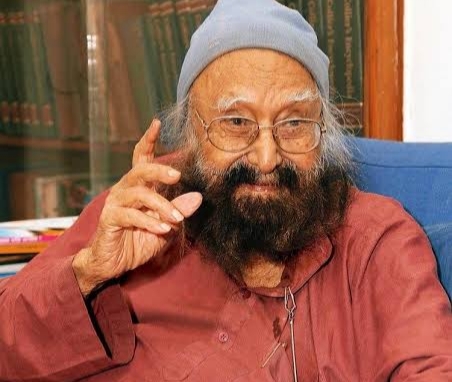Few Indian writers have left as deep and diverse an imprint on literature, journalism, and public thought as Khushwant Singh (1915–2014). Known for his sharp wit, fearless commentary, historical works, and unapologetic writing style, Singh was a towering literary and journalistic figure of 20th-century India. His career spanned more than six decades, and his works continue to influence debates on history, politics, and culture in India even today.

This long-form biography explores his early life, education, literary career, political involvement, achievements, controversies, and enduring legacy—showcasing why Singh remains relevant in 2025 as readers, scholars, and journalists revisit his writings in a polarized era.
Early Life and Family Background

Birth and Childhood
Khushwant Singh was born on 2 February 1915 in Hadali, Punjab (now in Pakistan), into a wealthy Sikh family. His father, Sir Sobha Singh, was one of Delhi’s most prominent builders, involved in constructing landmarks like Connaught Place and Rashtrapati Bhavan. Growing up in a privileged household exposed Singh to elite society, but his sharp observational eye later turned this privilege into biting satire of the very class he belonged to.
Education
Singh attended Modern School, New Delhi, followed by St. Stephen’s College, Delhi University, where he studied English literature. Later, he pursued law at King’s College, London, and qualified as a barrister from the Inner Temple, London.
His international education gave him exposure to Western thought while his Punjabi-Sikh roots kept him deeply tied to Indian traditions. This duality shaped his unique perspective as both an insider and outsider in Indian society.
Career Beginnings: From Law to Literature
Legal Practice
After qualifying as a lawyer, Singh briefly practiced law in Lahore during the 1940s. However, he soon realized his true passion was writing, not legal battles.
Entry into Literature and Journalism
His earliest works appeared in literary journals, and by the late 1940s, Singh had embarked on a full-fledged career in writing. He joined the Ministry of External Affairs and worked with the Indian Foreign Service (IFS) for a short period. His stint as a diplomat in Canada and London broadened his worldview, later enriching his journalistic insights.
Literary Contributions
Khushwant Singh’s literary career is both prolific and diverse. His works encompass novels, short stories, historical accounts, translations, and essays.
Major Novels
- Train to Pakistan (1956)
Perhaps his most celebrated work, Train to Pakistan is a haunting novel about the Partition of India in 1947. Unlike historical accounts, Singh humanized the tragedy by focusing on ordinary people caught in extraordinary violence. The book remains a staple in postcolonial literature studies worldwide. - I Shall Not Hear the Nightingale (1959)
This novel, set in British-ruled India, explores themes of nationalism, colonial resistance, and personal ambition. - Delhi: A Novel (1990)
A magnum opus blending history, fiction, and satire, Delhi narrates the city’s story through centuries of invasions, love affairs, and betrayals. Singh’s raw and often controversial take on Delhi’s culture made it both praised and criticized. - The Company of Women (1999)
Known for its candid exploration of sexuality and relationships, this novel solidified Singh’s reputation as a bold and unapologetic writer unafraid of taboo subjects.
Short Stories and Essays
His short stories such as The Mark of Vishnu and Karma highlighted Indian society’s hypocrisies with humor and subtle critique.
Singh’s weekly newspaper columns, “With Malice Towards One and All”, became immensely popular for their mix of humor, satire, and commentary on current affairs.
Role as a Journalist and Editor
Singh was not just a novelist but also a pioneering journalist.
- Editor of The Illustrated Weekly of India (1969–1978): Under his leadership, the magazine’s circulation skyrocketed. He modernized its style and made it accessible to middle-class readers while tackling bold themes.
- Editor of The Hindustan Times and The National Herald: His columns were sharp, irreverent, and often critical of political leaders, including Indira Gandhi, with whom he had a complex relationship.
His journalism was admired for fearlessness but also drew criticism for occasional sensationalism.
Political Involvement
Member of Parliament
Singh served as a Rajya Sabha Member (1980–1986), nominated by then Prime Minister Indira Gandhi. While he was initially supportive of her, he became a vocal critic during and after the Emergency (1975–77).
Critic of Religious Orthodoxy
Though a Sikh by birth, Singh was critical of religious dogma across communities. He often championed secularism, rationalism, and freedom of expression—stances that attracted both admiration and opposition.
Awards and Recognition
- Padma Bhushan (1974) – which he famously returned in protest against Operation Blue Star in 1984.
- Padma Vibhushan (2007) – India’s second-highest civilian award, later reinstated after his earlier rejection.
- Numerous literary awards, including the Sahitya Akademi Fellowship.
- International recognition for his translations of Sikh scriptures and histories.
Personal Life
Khushwant Singh married Kawal Malik in 1939, with whom he had two children: Rahul Singh (journalist) and Mala Singh. Despite his reputation as a “ladies’ man,” Singh was devoted to his family.
Personality
Known as the “Dirty Old Man of Indian Literature,” Singh embraced this label with humor. He enjoyed whisky, poetry, and lively debates. His self-deprecating wit made him approachable despite his intellectual stature.
Challenges and Controversies
- Candid Views on Sex and Religion: Singh’s frank discussions on sex in his novels (The Company of Women) and critiques of organized religion drew backlash.
- Political Flip-flops: His changing stances—from supporting Indira Gandhi to criticizing her—earned him accusations of opportunism.
- Criticism from Sikh Community: Returning the Padma Bhushan after Operation Blue Star was praised by some but criticized by others who felt it politicized his identity.
Legacy and Influence
As a Writer
Singh democratized English writing in India, making it relatable to common readers. His works remain part of university syllabi and continue to be cited in debates on Partition, secularism, and modern Indian history.
As a Journalist
His columns influenced generations of journalists, setting a precedent for combining humor, criticism, and accessibility.
Comparisons with Contemporaries
- Unlike R.K. Narayan, who painted India with gentle humor, Singh used sharp satire and often dark realism.
- Compared to Mulk Raj Anand, Singh was less idealistic but more candid about human flaws.
Why He Matters in 2025
In today’s climate of political polarization, religious debates, and censorship, Singh’s voice for free speech, rationalism, and fearless writing resonates stronger than ever. His life and work serve as a reminder of the importance of dissent and satire in democracy.
Pros and Cons of His Life Choices
Pros:
- Fearless writer who broke taboos.
- Humanized Partition in literature.
- Advocated secularism and rational thought.
Cons:
- Sometimes sensationalist in his journalism.
- Criticized for being inconsistent in political allegiances.
- Sexual themes in his novels divided critics and readers.
FAQs
1. What is Khushwant Singh most famous for?
He is best known for his novel Train to Pakistan and his witty, satirical journalism.
2. Did Khushwant Singh return his Padma award?
Yes, he returned the Padma Bhushan in 1984 to protest against the Indian Army’s Operation Blue Star.
3. How did Khushwant Singh view religion?
Though born Sikh, Singh was critical of religious orthodoxy across communities and advocated secular, rational thought.
4. Why is Khushwant Singh relevant today?
His fearless defense of free speech, secularism, and satire resonates strongly in contemporary India’s socio-political climate.
5. What was his last major work?
One of his late works was The Sunset Club (2010), a novel reflecting on aging and mortality.
Conclusion
Khushwant Singh was more than just a writer—he was a chronicler of India’s Partition, politics, and paradoxes. His life, spanning nearly a century, mirrored India’s transformation from colonial rule to a modern democracy. Through novels, essays, and journalism, Singh challenged hypocrisies, celebrated humor, and defended secular ideals.
In 2025, as India grapples with issues of identity, censorship, and free speech, Singh’s works stand as a beacon of intellectual courage and literary brilliance. His legacy is not merely in the books he wrote, but in the questions he dared to ask of society.
Related Reading:
Thank you for reading!
Stay tuned for more inspiring Books summary, Author spotlight, Trend Books & more get full information on TheBooksX.com!






